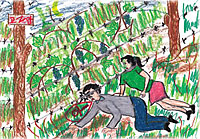




Yoo Young-soon , 57, worked in a coalmine in North Hamkyung province in North Korea until she escaped to China in the 1990s. She lived in hiding in China for seven years and paid a broker to smuggle her into South Korea with her son is 2003. She now works in construction and motel housekeeping, earning roughly 50,000 won per day (U.S.$50). Her son sells second-hand cars, while her daughter remains in China. She spoke to Jinseo Lee of RFA's Korean service in March, 2006:
So far I haven't seen anybody looking down on me just because I am a North Korean defector. When I say I am from the North, people become curious. Many of them ask me what my life was like in the North,
“It is very tough. I am very busy. But my son has to get married and I have to bring my daughter here. And I also have to find my oldest daughter whom I have lost. I just have a lot of things to do. As a parent, you can say that you're done with your responsibilities only when all of your children are married… I still have many responsibilities. So I cannot sit around and do nothing. If I don't work even for a single day, I feel uneasy, and when work is unavailable, I get irritable. I feel comfortable only when I am working.”
“Motels [here] are sort of like hotels. It is a place where couples come and spend their time together. I ate and slept there, too. I cleaned from 10 a.m. until 1 a.m. I worked every day and took only two days off every month. It was a tough job but I could make good money. Construction work is not always available and sometimes I have to wait several days to work. When I am working at construction sites, I take out nails from building materials and recycle them. I sometimes, collect vinyl bags and when the buildings are constructed I clean the rooms. Women sometimes work on plastering, too.”
“I am old in years, but if you don't work you can't make a living here. But there isn't much people like me can do. I cannot have a desk job because of my age. You have to work to earn a living, so I take whatever job comes along... When you work in the North, the work itself isn't all that bad. But since you don’t get any money for it, it's lost labor. When you work in the South you can make money.”
“It is very difficult to live in the North. South Korea is a capitalist society, not a socialist one. In a capitalist society, you have freedom to work hard and get money in return. In North Korea, they say everyone lives in equality. The slogan itself sounds great but when you actually see the life of a laborer, there really is nothing to boast about.”
“So far I haven't seen anybody looking down on me just because I am a North Korean defector. When I say I am from the North, people become curious. Many of them ask me what my life was like in the North. When I was in Hanawon [where North Korean defectors are resettled], I was told to say that I am from Kangwon province and not from the North…”
“South Korean people pray with all their hearts for unification of the country, don't they?... People don't treat you coldly just because you are from the North. People are all nice. But sometimes I feel embarrassed and different about saying that I am from the North, so I sometimes tell them I am an ethnic Korean from China.”
“My son [gets into fights but] does not get beaten. If not provoked he does not get into fights. He is a kindhearted person. For older people like me, it is not that difficult to adjust because we can tolerate things. But young people have a harder time because stress builds up and they get hurt at the slightest provocation. It breaks my heart to see my son having a hard time adjusting.”
“My plan for this year is to visit China in August… After that, I have to work hard to marry my son off. Then I will have to sell my household furniture and prepare for my retirement.”
Translated by Min-Kyung Kang. Please continue to send contributions to RFA's Women in Their Own Words project to women@rfa.org .